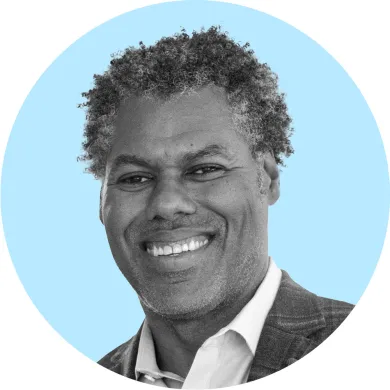What’s the biggest misconception people have about negotiations?
Margaret Neale: “That negotiation’s a fight. Most folks walk into a negotiation expecting a battle. They get all armored up, they get all anxious, and when they expect a fight, they get a fight. The reality is that negotiation is a dyadic interdependent decision. No one can force anybody to say yes. I’ve got to agree to what you offer and you’ve got to agree to what I offer. This is almost an ironic statement, but I don’t negotiate anymore. I problem-solve. And that, I think, turns out to be a lot better.”

Brian Lowery, Walter Kenneth Kilpatrick Professor of Organizational Behavior at Stanford GSB
Brian Lowery: “People don’t see how often they’re negotiating. In fact, you can say any interaction where people have preferences and they’re trying to come to a decision jointly is a negotiation. When you go out with your partner and you’re like, What are we going to have for dinner? That’s negotiation. Are we going to have kids or not? Negotiation. What are we going to do on vacation? Negotiation. If you think about engaging with other people and there are decisions to be made, there are constant negotiations happening.”
Michele Gelfand: “One of the most common misperceptions is that it’s an awful experience. When I’ve interviewed people about their metaphors for negotiation, a lot of times they will say it’s like visiting a dentist: It’s a necessary evil; you’ve got to do it. It feels very intimidating, particularly for certain groups. Negotiation is inherently a cooperative exercise but you’re competing at the same time. So there’s this dance between being cooperative and competitive. A lot of times people put a lot of weight on the competitive part. I think about it as an incredible creative decision-making process where if you can really understand each other’s interests and then dig deep into how you can accomplish both of your priorities, it could be incredibly rewarding.”
Nir Halevy:“People have a very narrow conception of power. If they think about power in a more holistic way, they’ll realize that they bring sources of power and leverage to the table that they didn’t realize they had before. For example, people neglect power that comes from their social network ties, their unique knowledge and expertise, their personal characteristics that are associated with status, their interpersonal demeanor, even features such as height or fluency or charisma. If you think in a more multifaceted way about power it can help you be better prepared and feel more powerful in negotiation.”
Tip: Think Long Term
“Many negotiations don’t involve a one-time interaction. They’re repeated games. You have to keep in mind that it’s not just this outcome, it’s future outcomes you’re also negotiating. If you’re at work, you’re frequently not going to have a one-time negotiation and never engage with that person again. You’re going to be negotiating with them all the time around all sorts of things. If you think about negotiating more broadly, you’re not going to go all in and get what you want every time, because that’s not going to serve you. To win the battle but lose the war is foolish.”
— Brian Lowery

Is it better to make the first offer in a negotiation?
“It does not matter if I’m talking to a group of CEOs or if I’m talking to undergraduates; about 80% of folks say the comparative advantage lies with those who receive the first offer,” Neale says. Yet she and her colleagues say the answer to this common question is not so clear cut.

Margaret Neale, Adams Distinguished Professor of Management, Emerita, at Stanford GSB
In certain situations, receiving the first offer can provide crucial insights into your negotiating partner’s thinking. “Negotiation is an information asymmetry game,” Neale says. “If there’s a lot of information asymmetry, then receiving the first offer can help you figure out what’s important to the other side.”
Yet making the first offer comes with a big advantage: anchoring bias — our tendency to incorrectly adjust our counteroffer in response to an initial offer. “Once someone makes that offer, it’s hard to get away from it in an opposite direction,” Gelfand explains. That can be useful in one-time distributive negotiations, like when you’re buying a car. “You’ve got to really be very aggressive but realistic with your first offer,” she says.
Ultimately, the decision to make the first move depends on context. “You want to make an informed decision on which tools from your negotiation toolbox you’re going to use,” Halevy says. “If you decide that anchoring is going to be one of these tools, then you could go first and make the first offer. However, if you think that active listening is going to be an important tool in a given negotiation, maybe going in with a listening learning mindset would be more impactful.”
Tip: You Have the Power
“Power imbalances are great. People don’t do a good job understanding how important power imbalances are. I did a study where there were two powerful people negotiating, a powerful and a less powerful person negotiating, and two low-power people negotiating. The best outcome came with the high- and the low-powered people, not the two high-powered people. In the asymmetrical power condition, the low-power party had to figure out a way to feed the beast — the high-power player. They were motivated to figure out where the opportunities for value creation were. High-power players are not interested in value creation because they’re just going to be value-claiming. They don’t really understand how big the pie could be. The low-power player can create a much larger pie and give the high-power player the part that they think they deserve. And so, the low-power player may end up actually doing very well, but it takes motivation to understand that the low-power player is the engine of value creation.”
— Margaret Neale

Is a win-win deal always possible?
Margaret Neale: “No. I’m very careful not to characterize things as a win-win. Negotiation is a dyadic interdependent process. So I at least have to be kept whole, right? I may not be better off, but I at least have to be kept whole. So do you. Otherwise, why would reasonable people say yes to things that make them worse off?”
Nir Halevy: “Sometimes people associate win-win with equal margin of win or identical benefits. That’s not how a lot of negotiation researchers think about win-win. When we say win-win, we mean that both parties got a deal that’s better than the alternative. If both improved relative to what they would’ve received in the absence of a deal, then they both have won in some sense. It doesn’t have to be symmetric or identical.”

Michele Gelfand, John H. Scully Professor in Cross-Cultural Management and Professor of Organizational Behavior at Stanford GSB
Michele Gelfand: “I’m slightly obsessed with win-win negotiation. There are clearly times when you don’t have the time to do it. It’s very exhausting. It takes a lot of energy. But the fact is that the more issues you have on the table, the more win-win potential there is because there’s going to be some probability that you have differences in preference, differences in priorities. So the more issues you have, the more alternatives, the more you will be able to get to a win-win structure.
Jonathan Bendor: “Anyone who promises you that if you read their book, you’ll always do well in negotiations, is either fooling you or themselves or both because there are always going to be negotiations in which there are no good solutions. To paraphrase Voltaire, sometimes the good is the enemy of the optimal. Because if you keep looking for a good alternative and none exists, you’re going to throw away the best alternative.”
Tip: Mind the Cultural Gaps
“It’s really important to remember that much of what we know about negotiation from a scientific point of view is based on Western samples by Western theorists. There are certainly things that might generalize across cultures, but there’s certainly going to be a lot of room for difference. People also don’t realize they’ve been profoundly socialized to adopt certain values, assumptions, and beliefs about negotiation. We don’t realize we have certain metaphors for negotiation — a lot of sports metaphors, battle metaphors, game metaphors. Those don’t translate in a lot of cultures — literally. If we don’t understand the metaphors that other cultures are using, then we won’t be able to make sense of their behavior or what’s important to them.”
— Michele Gelfand

How do you prepare for a negotiation?
“It’s shocking how little preparation people do for negotiations,” Lowery says. “That’s a serious mistake.” Before heading into a negotiation, you and your team should answer some basic questions about your expectations and goals. “What is our aspiration? What is the outcome we would feel very happy with? These are things that people should know before they go into a negotiation.”

Jonathan Bendor, Walter and Elise Haas Professor of Political Economics and Organizations, Emeritus, at Stanford GSB
Bendor recommends doing “a basic strategic diagnosis” to explore the possible pathways an upcoming negotiation might take. “In most negotiations, there isn’t an unconditional answer to almost any question about, should I do X? If the situation is Y, you should do X. If it’s Z, you should not do X. You’re not being wishy-washy by saying that.”
Jon Atwell suggests rehearsing what you plan to say in advance. “It’s incredibly useful to formulate and practice some lines for key points in the conversation. If you’re just sort of fumbling around in the moment, it’s a lot harder to steer the conversation exactly where you want to go.” Try practicing out loud or in front of a mirror. “Doing it with people is excellent,” he adds.
Similarly, Halevy says you should seek out honest assessments of how you come across in a negotiation. “I encourage people to practice a lot with others who can give them honest feedback. Do they speak extremely fast? Are they clear? Do they make sense? Is there a fit between the verbals and the nonverbals that they communicate? Getting that feedback is critical.”
Tip: Get Into Their Heads
“Although humans are good at thinking about other people’s minds, we’re not nearly as good as we think we are. It’s called ‘taking the perspective of the other,’ and we often do it quite superficially. I urge my students to think of the other person in a negotiation as drawing from an underlying distribution of possibilities. That’s hard for people to do. Normally what they do is they form an impression and then they stick with it. The impression is a guess about the other person’s perspective. Human beings are incredibly complex. We’re not automatons, and variability is the name of the game. It should be routine to go into a negotiation with a short list of things you’re uncertain about or don’t know. Once you understand that then you can learn in real time. You’re not going to learn in real time if you come in thinking you know everything.”
— Jonathan Bendor

When should you walk away from a negotiation?
Nir Halevy: “If you are greatly disengaged or indifferent about the process and the outcomes, maybe that’s a reason to not go through with the negotiation. It’s also important to recognize principles, values, and justice when thinking about when to walk away. When people are rude or behave in ways that are extremely offensive, people are quick to recognize that. We always recommend that people devote sufficient attention to developing strong alternatives. Hopefully there is someone else who would be able to work with you on a deal who’s not rude and who is willing to respect your principles and your values.”

Nir Halevy, Jagdeep and Roshni Singh Professor of Organizational Behavior at Stanford GSB
Margaret Neale:“Before you even begin, you need to understand what your alternatives are and what your reservation price is. That’s the point of indifference between a yes and a no. Where is that that tipping point? If you are at your bottom line or your reservation price, you should be willing to flip a coin, and if it lands heads, you walk away. If it lands tails, you stay. That’s really hard for folks to do because we are so steeped in the belief that negotiations, in order to be successful, must get a yes. That book Getting to Yes is a real problem because the goal of a negotiation is not to get a deal. The goal is to get a good deal. So you need to understand where that point is where you’re willing to walk away.”
Jon Atwell: “As you’re starting to approach your reservation price point, you try to get yourself more comfortable with walking away. There are very few instances in which the thing you’re negotiating over is so unique that you have to have it.”
Brian Lowery: “The best advice for negotiation is always to figure out what your best option to that negotiation is before you go in. If you go in and this is the only possible option, you’re screwed.”

What is something more people should negotiate for?
Jon Atwell: “A lot of people don’t negotiate their salaries and benefits enough for their first or second jobs. Coming out of school, you feel excited about your first job, your expenses are low, so you don’t have much of an imperative to negotiate hard. But through the miracle of compounding interest or compounding rates, small differences in the beginning can really add up. I also think that the confidence and assertiveness that you should bring to a negotiation signal good things about your ambition and commitment to a job.”

Jon Atwell, Assistant Professor of Organizational Behavior
Nir Halevy: “More people should negotiate for contingent contracts or contingent clauses in their contracts. If you think you’re going to be the best salesperson in a particular division or department, you want to link your future performance to your compensation or the pace at which you’ll get promoted. Same thing if you develop a new product or a service. You want to make sure that if it’s going to be hugely successful, you’re going to benefit from that tremendous upside.”
Margaret Neale: “You need to ask for what you want, period. If you don’t ask for what you want, how will anybody know what it is you want? And if you don’t ask for what you want, who will? One of the things that we know from decades and decades of research is that people want to help. They’d like to have the agency to be able to say yes to you. And giving folks that agency is a gift to them.”
Tip: Don’t Negotiate With Yourself
“People really need to stop negotiating with themselves. As people are preparing for a negotiation, rather than think through exactly how they’re going to get through an uncomfortable patch of asking for this thing that they’re worried someone doesn’t want to give them, they instead convince themselves that they don’t want it or need it. A lot of people spend too much of their time as they’re preparing negotiating with themselves, lowering their expectations, and justifying it, rather than going the other direction of actually asking for more. To the extent that you’re aware that you’re doing that and can recognize that, you can stop.”
— Jon Atwell